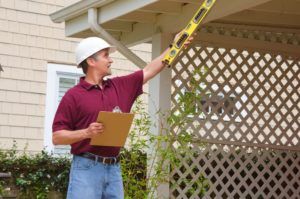7 Types of Roofing Scams to Avoid
Published on Wednesday July 17, 2024Every year, uninformed homeowners fall victim to roofing scams. These schemes can leave families stuck with poorly built roofs on their homes. Through no fault of their own, these homeowners put their trust in people who have no business calling themselves roofers.
We’ll show you how to avoid the seven most common roofing scams so you won’t become a victim. With these tips, you can feel confident in choosing an honest and reliable roofer.
The 7 Most Common Roofing Scams
Scammers use all kinds of methods in their craft. These are the seven most common you might encounter as a homeowner. Keep in mind that trustworthy roofing companies won’t try to pull any of these tricks.
1. Storm Chasers
Anxious and vulnerable homeowners look like easy prey for opportunistic fraudsters after a big storm. Some roofers, called “storm chasers,” follow bad weather events in search of roofs damaged by rain, hail, or other elements.
You can often spot them going door-to-door, passing out leaflets, and offering to repair or replace roofs that appear damaged–even if that roof has no damage at all. They might show up at your door unannounced, claiming that they’ve just finished repairing another roof nearby, thereby “proving” that your neighbors already trust them. They’ll claim to have extra materials from the previous job and will offer you a special discount to do your roof, too. Then they get paid, and you’re left with a poorly constructed roof that you may not have needed in the first place. By the time you realize what’s happened, they’re long gone.
If your roof is damaged in a storm, do your own research first and contact a reliable, legitimate company.

2. Bids That Are Too Good to Be True
When shopping for a roofing contractor, some phony or uncertified “professionals” will offer you a temptingly low price–often far lower than any other competitor in your area. It seems like it’s too good to be true, and it is. Because once work begins, that price will almost certainly creep up due to “unforeseen problems” and inflated material costs.
In this scam, you get what you pay for. The costs of roofing materials do fluctuate, but a good contractor will discuss that with you before starting the project.
3. Mystery Damage
Your roof seems fine. Even after a major storm, you notice no damage, not even a minor leak. Then, out of the blue, a roofer contacts you about “damage” he saw on your roof. You can’t really see what he’s talking about, but he claims it’s pretty significant and needs to be addressed immediately. Maybe he’ll even offer to climb up and take a closer look. When he comes down, grim-faced, he’ll tell you it’s a real mess up there.
Some shady roofers will claim a roof has damage when there is none or not enough damage to justify a total roof replacement. Some scammers might even create damage themselves. Don’t let strangers onto your roof!
4. Insurance Fraud
A shady contractor can attempt to commit insurance fraud in several ways. One is by submitting two separate invoices: a lower one to the homeowner and a more substantial one to the insurance company. Sometimes, a contractor will claim that they’ll get enough money back from over-billing your insurance company to reimburse your deductible.
This is not only a roof repair scam but insurance fraud, and you could be prosecuted, even if you’re the victim. Don’t let anyone commit crimes on your behalf.

5. High-Pressure Sales
One of the most common roofing scams involves a contractor who pressures you to sign a legally binding contract on the spot without giving you time to check his company is legit. Most people are susceptible to high-pressure salespeople, so this is an easy way for scammers to make a quick buck. They’ll use all kinds of tactics to keep you “hooked” on their sales pitch, including making you feel guilty for wasting their time or silly for not trusting them. When in doubt, just walk away.
Honest, quality contractors want you to feel good about choosing them and won’t pressure you to make an on-the-spot decision.
6. Low-Quality Materials
Shady contractors will inflate their profit margins by charging a lot to perform repairs using such low-quality materials that the work must be done again. In many cases, these repairs appear to have solved the underlying issue. The reality is that this is just a cover-up for a worsening problem that will ultimately cost the homeowner a lot more money down the road.
These scams can be difficult to spot until it’s too late, which is why it’s so important to research a company upfront. Look for positive reviews of roofing companies in your area so you know who to trust.

7. Large Down Payment
A clear sign of a roofing scam is a contractor who demands a large down payment before beginning work on your roof. These con artists take the homeowner’s money and run, never to be heard from again.
Down payments for roofing work are perfectly reasonable. Respectable contractors will charge a modest down payment to cover the cost of materials they need to get started. However, down payments shouldn’t exceed 20% of the projected total bill. If you receive an estimate from a contractor with a 50% down payment or higher, that’s a big red flag they might be a scammer.
How to Avoid Roofing Scams
Although scammers are skilled at their work and can be hard to spot, we have some tips on staying vigilant in avoiding potential scams.
Tip 1: Don’t Rush Into Anything
Scammers will try to take advantage of your anxiety in the aftermath of a storm, insisting that work must be done quickly or by pressuring you to sign a contract with them on the spot.
Before you agree to work with a roofer, take your time, ask to see insurance and references in your area, check the status of their roofer’s license, and visit the Better Business Bureau to see if there are any complaints filed against them.
Good roofing companies let their reputations speak for themselves without chasing storms or pressuring you into signing contracts.
Tip 2: Do Your Own Research
Talk to various companies about their pricing models to get a bigger picture of industry standards. It’s important to be on the same page with your contractor about the project’s timeline and pricing, including down payments. Signed, legally binding contracts are tough to get out of.
A reputable contractor will be fully transparent about costs or materials. They also know that you’re probably shopping around and respect your right to get multiple quotes.
Tip 3: Be Wary of the “Good Samaritan”
How likely is it that someone with roofing experience just happens to be driving by your home and spots serious damage to your roof from a moving vehicle? Not very. If you think they might have a valid observation, get a second (and possibly third) opinion.
Under no circumstances should you let a stranger on your roof, or should you sign a contract based on an out-of-the-blue sales approach. Honest roofers will point out any damage they find and discuss options with you.
Tip 4: Listen Carefully to What’s Being Offered
Keep in mind what we said above about offers that sound “too good to be true” or contractors who talk about committing insurance fraud. It’s always better to be safe than sorry, especially when it comes to protecting your home and money. Don’t let a stranger’s promises end you up in court.
Tip 5: Don’t Hesitate to Say “No”
Just because you agreed to meet a contractor for a scheduled appointment or consultation doesn’t mean you’re obligated to sign a contract. No respectable contractor will pressure you into signing something before you’re absolutely ready. Remember, estimates are part of their job.

Roof Replacement Experts You Can Trust
At Long Roofing, we take pride in our unwavering commitment to skill, safety, and reliability. For over eight decades, we’ve provided quality service to happy, loyal customers. Our entire roof system is supported by a 50-year, non-prorated, transferable warranty, a testament to our confidence in our work. We know you’ll be satisfied with your new Long roof.
We build trust and peace of mind into every roof we install. Contact us today for a free estimate!
Interested in Long Home Products?
See our special offers now.








